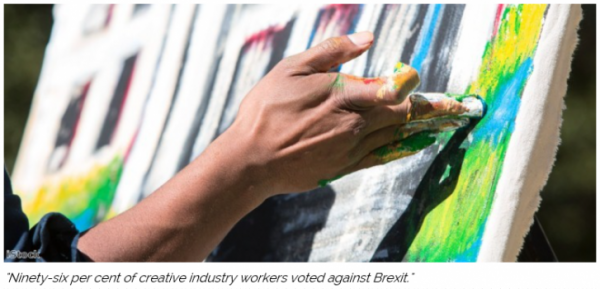El sector cultural anglès davant el Brexit
Mia Jankowicz | Politics.co.uk
A quins reptes s’enfronta el sector cultural anglès pel que fa al Brexit? Mia Jankowicz signa un interessant article per comprendre els aspectes essencials que conformaran el nou panorama de les arts i les indústries creatives després del 29 de març, així com el posicionament i les reaccions dels agents implicats.
L’article posa de manifest que el Brexit desafiarà tots els pilars del sistema cultural anglès, que actualment depèn de subvencions públiques, fons privats, dinàmiques de mercat, la legislació i el lliure flux de gent i informació, en els estrats nacionals i internacionals però sobretot comunitaris. La retirada de les negociacions sobre el Mercat Únic Digital (DSM), un sistema de propietat intel·lectual basat majoritàriament en la legislació europea, els fons provinents de Creative Europe o els intercanvis d’idees i projectes entre artistes propiciats per la facilitat de moviment i la proximitat geogràfica entre els països de la UE són alguns dels temes que es posen sobre la taula.
‘Britain's thriving art scene strangled by Brexit chaos’
«As far as industries go, the creative sector is about as Remain as it gets. Ninety-six per cent of creative industry workers voted against Brexit. They are more pro-Remain than fishermen were pro-Leave (92%). But now, in the wake of the vote, artists, designers and musicians are having to pick themselves up and assess the damage.

You'd suppose that this objection is cultural, and it often is. But there are also hard economic calculations taking place.
Creative industries constituted nine per cent of Britain's service exports between 2009 and 2014, with over 57% of that going to the EU. Our cultural goods exports are similarly valuable, with the UK exporting £2.1 billion more films, books and CDs than it imported over the same period.
In terms of art and culture, Britain has a good thing going on. Arts organisations surveyed in 2015 by Arts Quarter had been cautiously buoyant about their projected income and ability to deliver future projects.
Then Brexit happened. In the wake of the vote, Arts Quarter conducted the same survey again with largely the same respondents. Optimism had flatlined.
The creative sector - from not-for-profit art trusts to high-end commercial outfits - depends on an interconnected web of public funding, private donations, market dynamics, legislation and a free flow of people and information. Brexit challenges all these elements at once.»
Podeu llegir l’article sencer aquí.
Inicieu sessió o registreu-vos per a enviar comentaris
- blog de Interacció
- 1700 lectures





